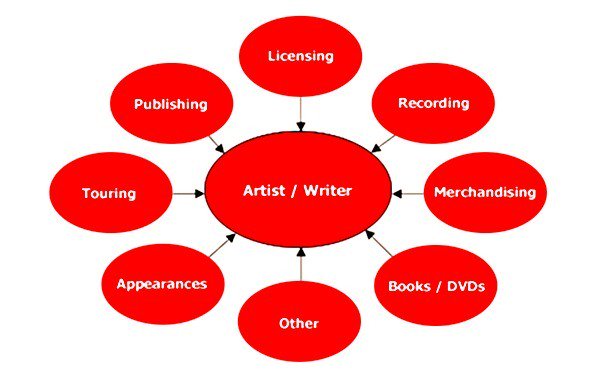A 360 deal is an option record labels offer to try and combat the current effects of the Internet age. It is used as a counterplan in order to make up the loss of income in their investments (the artists) due to downloading and streaming.
A typical 360 deal is usually done by a major or larger record label that puts a large initial financial investment into a newly signed artist. In order for the label to counter the loss of sales from physical albums, they become involved in all (360 degrees) revenue aspects of the artist, including record sales, publishing, touring, merchandise and any other forms.
The problem with these deals is that the large majority of artists make most of their actual incomes from these other sources of revenue, especially ones who aren’t radio-friendly or a mainstream pop artist. Most of these cuts will go to the record label through gross revenues, meaning all of the cuts you as an artist take a hit on for the things you need, like publishers, managers and booking agents, are not considered in the revenue you owe. The percentage will stay the same, causing you to end up with even less in your own pocket. The record labels also still own all the rights to your music, despite you paying them back on their initial investment. This might not seem fair to a lot of people.
There are a few positives in the 360 deal system, however—being that there is no set system yet. You as the artist have the right to negotiate your terms to what you are happy with, and you have the power to try and find the best medium. I have personally known quite a few artists who went with the 360 deal platform. Some made their own unique terms like getting a weekly paycheck of an agreed amount no matter the quarterly revenue. You can try to look at it as a safety net, because you will always have a steady check coming in to pay your bills. However, if you do eventually end up breaking through to that next level, you won’t see a large chunk of the profit you otherwise would have without the 360 deal.
360 deals also help newer artists by having the label front the cash for touring and merchandise during the initial year(s) without the hassle of having to deal with third party collectors. Either way you want to look at it, it’s an interesting element that is being more commonly used to counteract the negative effects of ever-growing technology in the music industry.
In the end, you have complete control as an independent artist. By taking advantage of service like the ones offered by Symphonic and other free tools you have access to on the Internet, you can promote and distribute your music and build up a fan base all on your own. When those record labels do come knocking—if you decide to go that route—you will be able to negotiate and get the best terms possible for your interest as an artist.
By: Grant Brandell
Service & Product Sales Manager for Symphonic Distribution











